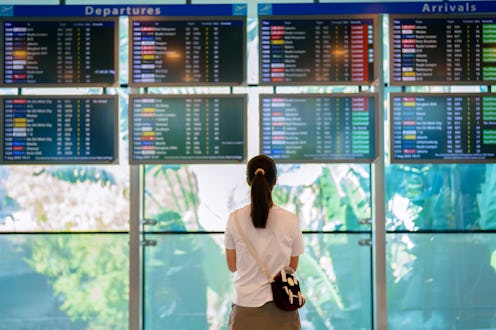Life
The Real Reason You Choose The Vacay Destinations You Do

In a time when pretty much everyone is connected on social media, the quickest way to get an ego boost is posting vacation pictures online for everyone to see (and more importantly, like). Two hours and 45 fawning comments later, you're guaranteed to feel like a rock star. In fact, the lure of positive feedback is so strong that most people take it into account when choosing a vacation destination. According to recent research, factors like weather and the likelihood of, say, totally depleting your savings account pale in comparison to how cool the pictures will make you look on social media. But you probably already knew that, didn't you?
In a paper published in Tourism Management, researchers at the University of Georgia looked at the relationship between the desire to travel to a certain destination — in this case, Cuba — and "social return," a.k.a. the amount of positive feedback generated by a post on social media. At the time the study was developed, the United States had just lifted certain travel restrictions on the country that had been in place since the '60s. (These restrictions have been tightened once again under the Trump administration.) Naturally, with many Americans scrambling to visit the island before tourism changed the experience, it became a particularly hot destination for a few years. With that in mind, the study's authors tried to predict whether travelers would rather visit Cuba in the short term, before the novelty wore off.
First, researchers developed a "social return scale" to measure how well people expected their travel posts to do online. Next, they asked 758 American travelers to use that scale to rate the expected social return of a trip to Cuba one year, five years, and ten years from now. Finally, they asked the same group of travelers whether they actually planned to visit Cuba.
According to the study's results, the expected positive feedback heavily influenced whether a traveler planned to tour Cuba. In other words, the more attention someone expected a trip to the country to receive online, the more likely they were to say they intended to visit. Social return was best able to predict travel within the next year, leading researchers to conclude that the potential for positive feedback is at its most influential in the short term.
So what does all this mean? For one thing, the study is yet another check mark in the" social media has changed everyday life" column. Back in ye olden days, vacation pictures were an ordeal only the truest friends suffered through without yawning and/or begging for mercy. Today, Instagramming and Snapping every last instant of your travels, whether you stayed close to home or ventured off to some far-off paradise, is not only expected, but encouraged by the near-instant gratification of dozens of comments, shares, and likes. Did you really kayak in a bioluminescent river if you didn't post the proof on social media afterward?
The study's authors note that this has heavily impacted modern travel. On top of considering price and whether they'll actually enjoy themselves, people take into account the kind of image they want to project to their online followers. Like it or not, the more glamorous destinations will get more attention.
Social media doesn't just influence users' choices in vacations; it has also impacted the way they plan their trips in general. According to a study earlier this year, millennials are far more likely to use information from their peers online, as opposed to guidebooks, to decide where to stay, what to do, and how to get there in the first place. Clearly, the golden age of the travel blog is taking place right now.
So next time you're planning a vacation, don't be ashamed if you take the potential for glamorous bikini pictures into account. You certainly aren't the only one.
Images: YoungNH/E+/Getty Images; Giphy